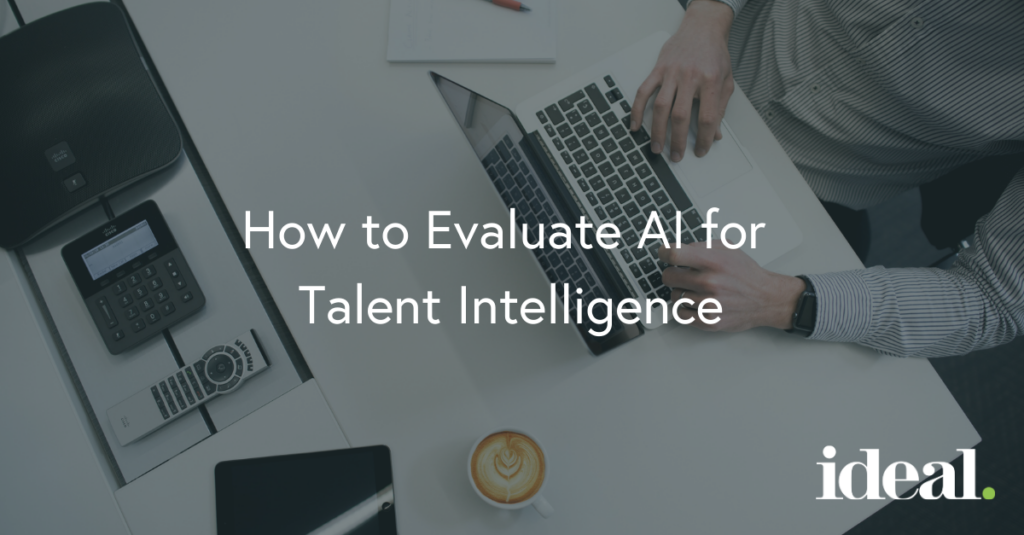
Which talent intelligence solution fits seamlessly into your technology stack? With numerous options on the market and a variety of flavors of AI, talent acquisition leaders have a wealth of features to wade through to find the right opportunity to increase your organization’s accuracy, efficiency, and fairness.
In response to COVID-19 and the changing world of talent intelligence, we’ve updated our Buyer’s Guide to Talent Intelligence. This guide is designed for talent acquisition leaders looking to thoroughly evaluate artificial intelligence technology for HR.
A More Resilient World Post 2020
Top leaders are rethinking their business practices in a virtual world. A 2020 McKinsey survey of 800 global executives revealed that “half have sped up the digitization of their customer channels, and two-thirds have moved faster to adopt artificial intelligence and automation.”
Leveraging technology for operational speed has become a necessity in a remote workplace. Cutting down on administrative tasks, filling in gaps without face-to-face interaction, and reducing the administrative tasks in a recruiter’s day in favor of high-value tasks are desires that all talent acquisition leaders share.
In a digital-centric ecosystem, processes are changing faster than ever and it’s a more than a matter of keeping up.
AI offers an exponential advantage for companies on an enterprise level, but some companies struggle with the transition from moving from consideration to implementation.

Validation and Fairness
Enterprise-wide AI has numerous applications, specifically for talent acquisition leaders with priorities to ensure and measure fairness through their process. One of the most important questions leaders should ask their vendors centers around mitigating bias and algorithm explainability.
A study of 5,000 C-level executives by IBM shows that “82 percent of businesses surveyed are considering using AI, but 60 percent are hindered by concerns over trust and compliance.”
AI should never be a black box solution. An artificially intelligent integration should provide transparent logic and validation with every grade. A human employee should always see the reasoning behind machine learning recommendations. Having confidence in your AI solution is important, not only for your talent acquisition team, but your entire organization.
This guide shows organization leaders what they should keep in mind when understanding AI’s explainability and reasoning when it comes to fair decision-making.
Evaluating Hiring Accuracy
Hiring top talent is a key priority that impacts the entire organization. The goal is finding qualified candidates who will remain at your organization for years with good retention always in mind.
So how can you evaluate artificial intelligence for accuracy?
Grade explainability. AI should always show transparent logic and demonstrate statistical validation.
Adverse impact. AI should have trained models to measure and detect bias in every stage of the hiring process.
Predictive data elements. Compare new hires with current successful employees in those roles, all from the data within your ATS.
Compliant with Governing Data Privacy Acts
Data compliance and protection are at the top of every shopper’s list for technology processing alongside their ATS. These systems contain an inordinate amount of private information that requires meticulous standards of compliance.
Talent intelligence systems require a continued commitment to information security with countermeasures to protect against any external threats. This integrity and confidentiality are critical for a system that lives within your organization’s ATS.
Compliance standards to uphold:
- Equal Employment Opportunity Commission
- Office of Federal Contract Compliance Programs
- General Data Protection Regulation (EU)
- ISO 27001:2013 — Information Security Management Systems
Adding AI to your technology stack is more than just uncovering new data insights and adding a layer of efficiency, accuracy, and fairness to your talent intelligence strategy. Looking critically and tracking your own workforce data is important for the health and future of your overall organization.
Looking for detailed information on evaluating AI for talent intelligence solutions and a checklist for your internal team? Download our updated Buyer’s Guide to Talent Intelligence for a comprehensive breakdown.
